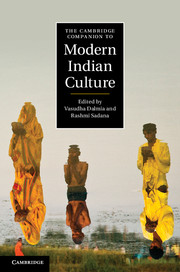Book contents
- Frontmatter
- Introduction
- Part I Cultural contexts
- Part II Cultural forms
- 6 The Bengali novel
- 7 Writing in English
- 8 Dalit life stories
- 9 National tradition and modernist art
- 10 Mass reproduction and the art of the bazaar
- 11 Urban theatre and the turn towards ‘folk’
- 12 Aesthetics and politics in popular cinema
- 13 Musical genres and national identity
- 14 Voyeurism and the family on television
- Further reading
- Index
- Cambridge Companions to Culture
11 - Urban theatre and the turn towards ‘folk’
from Part II - Cultural forms
Published online by Cambridge University Press: 28 May 2012
- Frontmatter
- Introduction
- Part I Cultural contexts
- Part II Cultural forms
- 6 The Bengali novel
- 7 Writing in English
- 8 Dalit life stories
- 9 National tradition and modernist art
- 10 Mass reproduction and the art of the bazaar
- 11 Urban theatre and the turn towards ‘folk’
- 12 Aesthetics and politics in popular cinema
- 13 Musical genres and national identity
- 14 Voyeurism and the family on television
- Further reading
- Index
- Cambridge Companions to Culture
Summary
The theatre of the new cities
The culture of the great metropolises of nineteenth-century India, foremost amongst them the colonial harbour cities of Calcutta and Bombay, produced a new kind of theatre which played itself out on a stage meant to replicate real life, as it claimed to present real situations, real history and even real gods. It catered to the middle classes, themselves in a formational stage, and was clearly a configuration of parts that had heterogeneous origins. But to the progenitors of this new culture, playwrights, actor-managers and critics no less than audiences, operating under colonial rule in constant interaction with a dominant, still very foreign culture with which it was also essential to establish equivalences, it was of vital importance to stress the indigenous origins of this new theatre and the classical tradition to which it declared itself heir. And if Western orientalists were most often quoted as authorities as to what constituted this classical tradition, their views were adapted by Indians to suit increasingly nationalist purposes.
William Jones, the first high-standing civil servant to write at any length on such matters, in the preface to his translation of Kalidasa's fifth-century Sanskrit drama Shakuntala (1789), had also been the first to announce the sensational new discovery of the national drama of the Hindus to the Occident. ‘Dramatic poetry must have been immemorially ancient in the Indian empire’, he had speculated.
- Type
- Chapter
- Information
- The Cambridge Companion to Modern Indian Culture , pp. 206 - 225Publisher: Cambridge University PressPrint publication year: 2012
- 1
- Cited by



